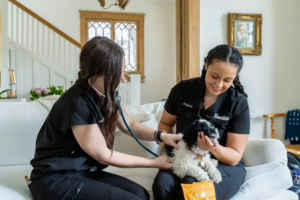These internal organisms live off their hosts, causing a range of problems for dogs, from itchy skin to serious digestive issues. To deter these uninvited guests, parasite prevention is an essential part of veterinary care.
What are Intestinal Parasites?
Intestinal parasites are worms or microscopic organisms that live in a pet’s digestive system. Some parasites steal nutrients, while others attach to the intestinal lining and feed on blood.
Intestinal parasites are extremely common and easily transmissible from food or environmental exposure. The good news — treatment is available! There are so many ways to prevent and treat parasites these days. In most cases parasites are easily treatable and pets can make a full recovery with proper care.
Signs of Intestinal Parasites in Dogs
Symptoms can range from mild to severe. If your dog presents any of the following symptoms, especially if you notice symptoms escalating in severity, contact a veterinarian immediately.
Common symptoms of a parasitic infection in dogs include:
- Weight loss
- Diarrhea or vomiting
- Lethargy, weakness or low energy
- Changes in appetite, increased or decreased
- A distended or “pot-bellied” belly, especially in puppies
- Scooting or rubbing rear end against the floor to relieve itchiness
- Visible worms or worm segments in the stool, vomit, or fur near the anal region
You know your dog best and might be able to easily recognize the symptoms above. However, some dogs may show no symptoms at all, which is why we recommend a fecal exam every six months. This is because it’s better to have a false alarm than to let a parasitic infection go untreated, which can cause lifelong and potentially life-threatening issues.
7 Common Parasites in Dogs
There are many different types of dog parasites that can cause issues. The most common parasites in dogs include roundworms, hookworms, whipworms, tapeworms, coccidia, giardia and heartworms.
1. Roundworms
Roundworms are one of the most common intestinal parasites. These long, spaghetti-like worms feed on nutrients in your dog’s intestines, causing severe bloating and gastrointestinal distress for your pup.
Pets can become infected through contaminated soil, feces or infected prey. Puppies may also contract roundworms before birth or through nursing. Because roundworms shed eggs in feces, they can quickly spread in multi-pet homes or outdoor areas.
2. Hookworms
Hookworms attach to the intestinal wall and feed on blood. They can cause anemia, weakness, and, in severe cases, life-threatening blood loss.
Puppies and kittens are especially vulnerable. Hookworms spread through contaminated feces, ingestion of larvae or direct contact — such as walking on infected soil.
3. Whipworms
Whipworms are thin, whip-shaped parasites that burrow into the large intestine, causing inflammation and bloody diarrhea.
These parasites thrive in moist soil, where eggs can survive for years. Dogs become infected by ingesting whipworm eggs, often without owners realizing it. Regular screenings help detect infections before symptoms worsen.
4. Tapeworms
Tapeworms are flat, segmented worms that live in the intestines and are transmitted by fleas. They can cause intestinal distress and potentially stunt the growth of a growing puppy.
The most noticeable signs are small, rice-like segments near a dog’s anus or in their stool. These segments contain eggs that continue the infection cycle when swallowed by another animal.
5. Coccidia
Coccidia are microscopic parasites that infect the intestinal lining, leading to diarrhea, dehydration and weakness. Pets can become infected by simply licking their paws or fur. They spread easily in shelters, kennels and multi-pet homes through contaminated feces.
While their immune systems are still developing, puppies and kittens are more vulnerable.
6. Giardia
Giardia is a waterborne parasite that causes chronic diarrhea, weight loss and dehydration. Pets contract it from contaminated soil or water sources including parks, puddles, streams or shared bowls.
Giardia can be tough to get rid of, sometimes requiring multiple rounds of treatment. Clean water and sanitation help prevent reinfection. For more on Giardia, read this piece.
7. Heartworms
Although heartworms live in the heart and lungs and are not considered an intestinal parasite, they are by far the most important parasite of concern, with over 1.2 million dogs in the U.S. infected at any time. Unlike other parasites that spread through contaminated feces or soil, heartworms spread through mosquito bites and are the most common in southern states like Texas and Tennessee.
Heartworm disease is serious and potentially fatal. Prevention is much safer and easier than treatment, making monthly heartworm preventatives essential.
Diagnosing and Treating Intestinal Parasites
Regular screening for parasites should be done annually as part of your dog’s standard health checkups, but if your dog is suffering from acute symptoms a prompt visit with your veterinarian is recommended.
Diagnosis is minimally invasive and commonly done using stool samples or microscopic exams. While some, like tapeworms, may be visible in stool, most require laboratory testing for confirmation.
If your dog is diagnosed with a parasite, the treatment plan will likely include a deworming medication (can be oral or an injection) over a recommended period to kill the parasite. After the course of treatment, follow-up testing will ensure the parasites are completely eliminated.
Parasite Prevention Tips for Dog Owners
Preventing parasites is far easier than treating an infection. This is why preventive care is key for maintaining your dog’s health and keeping them safe from parasites.
For most dogs, it’s recommended to take some type of worm prevention year-round. In fact, most heartworm prevention products also contain a dewormer for intestinal worms. On top of preventive products, a few simple habits can help:
- Wellness exams every six months, including fecal screenings for parasites. This is especially important for puppies!
- Proper disposal of pet waste, and avoid areas with high levels of feces
- Consistent flea and tick prevention
- Providing clean water sources
- Regular cleaning of kennels and bedding
At the end of the day, awareness and proactive prevention is always the best way to protect your pets. Consider this blog a reminder to schedule an exam with your vet every six months, because these visits aren’t simply about checkups; they are your pet’s best defense against intestinal parasites.
For more in depth information on the parasites listed above, check out resources from the Companion Animal Parasite Council or the American Veterinary Medical Association.




